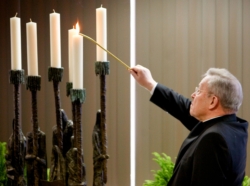Holocaust memorial rededicated at Pastoral Center grounds
BRAINTREE -- Representatives from many of Boston’s faith communities gathered at the Pastoral Center March 25 for the rededication of a Holocaust memorial menorah in what was described as a reaffirmation of the archdiocese’s commitment to the ongoing dialogue between Catholics and Jews.
Cardinal Walter Kasper, the Vatican’s chief liaison to the global Jewish community, was present at the rededication and called the memory of the Holocaust, “an unfinished agenda.”
“This memorial may remind us of the past, our common duty and our common responsibility for the future -- to work and pray for peace for the tortured region of the Holy Land, to work and pray for peace for the whole world...for this country and this city, and for us all,” said Cardinal Kasper.
The Yom Hashoah Menorah was presented to the archdiocese by Jewish leaders in 2002 and dedicated on the former Chancery grounds in Brighton.
The four-foot bronze Yom Hashoah Menorah depicts six men and women holding torches, representing the six million victims of the Holocaust, and a child and holy man clutching a prayer book set upon a cracked Star of David, inscribed with the years 1933-1945 and the first words of the ‘‘Kaddish,’’ a Jewish prayer of mourning the dead.
Among those present for the rededication ceremony were Greek Orthodox Metropolitan Methodios, Archbishop Cyril Bustros, eparch of the Melkite Greek Catholic Church in the United States, Jack Johnson, executive director of the Massachusetts Council of Churches and both the Israeli and German Consul-Generals in Boston--Nadev Tamir and Friedrich Lohr, respectively.
Following the series of speeches, a candle-lighting ceremony took place. Survivors and their descendents, Cardinals Seán P. O’Malley and Kasper, Rabbi Eric Gurvis -- president of the Massachusetts Board of Rabbis, Catholic teens and representatives from the Anti-Defamation League took part in the memorial service. Then, two prayers were read: “El Maleh Rachamim” and the “Mourners’ Kaddish.”
The decision to move the Holocaust memorial to the new Pastoral Center in Braintree was proposed by Cardinal O’Malley at a February meeting with a group of local Jewish leaders angered by the Vatican’s decision to lift the excommunication of Bishop Richard Williamson, a Holocaust denier.
In his address, Cardinal O’Malley spoke on the significance of the menorah as a tangible symbol of the archdiocese’s commitment to remembering the victims of the Holocaust and its lessons for humanity.
“It is a way for Catholics of the archdiocese to recall their spiritual kinship with the Jews, to develop a positive appreciation of Jews and Judaism,” he said.
“It is a reminder of the necessity for Catholics of the archdiocese to commit ourselves to the study of the Holocaust in order to promote a spirit of repentance; it is a means to stimulate discussion, mutual learning, respect and commitment to working together; and it is a recognition of the spirit that has existed between local Catholic and Jewish communities for decades.”
Speaking for the Holocaust survivors present at the rededication ceremony, Israel Arbeiter, a survivor and president of the American Association of Jewish Holocaust Survivors of Greater Boston, expressed his gratitude that Catholics and Jews can, “stand together against those who, today, conspire to repeat history, even as they deny that very history.”
“Your Eminence, pain and suffering have been inflicted again on the holocaust survivors by a representative of the Church, namely Bishop Williamson, and inaction by Pope Benedict XVI,” Arbeiter said.
“I know that Pope Benedict, in the last few weeks, took steps in the right direction, to ease the pain caused to us by this irresponsible statement, but I believe that more can and should be done, by the Church and by the pope,” he said.
At a media availability following the ceremony, Arbeiter elaborated on what he believes can be done to dampen the effects of Williamson’s “irresponsible statement.”
“I believe that if the pope would come out and say ‘yes there were gas chambers, yes there was gassing and I can attest to it,’ I doubt that there would be any good Catholic that would come out and say (the pope is) a liar and not telling the truth,” he said.
Cardinal Kasper reiterated to reporters that Bishop Williamson had not been rehabilitated and that he would not be brought back into full communion until he fully accepted the teachings of the Second Vatican Council.
“A Holocaust denier can have no place in the Catholic Church,” he said.
Cardinal Kasper said it was “sad and incomprehensible” that the pope was not previously informed of Bishop Williamson’s denial and said that he was deeply saddened when he was informed of the fact.
Nancy Kaufman, Executive Director of the Jewish Community Relations Council of Greater Boston, said that it is often in times of crisis that relationships are strengthened.
“What we were most proud of here in Greater Boston was that as soon as (the recent crisis regarding the reversal of Bishop Williamson’s excommunication) hit the airwaves, we were able to contact His Eminence immediately on behalf of the Holocaust survivors and set up a meeting with them,” she said.
“I think even some of us here today remember when relationships between Catholics and Jews in Boston were not so good and we did not have the ability to have an open and honest dialogue,” said Kaufman.
“The ability to raise difficult issues like this one, to have the discussion, and then to agree that this was a very serious and sad situation speaks to the strength of this relationship.”



















